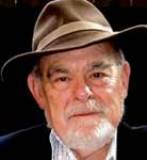Winner of the 2011 Publisher's Special Award — Stanley Meisler (PC/HQ 1963-67)
In 2011 Stan Meisler published When The World Calls: The Inside Story of the Peace Corps and Its First Fifty Years. It is a comprehensive history of the agency written by someone who knew the Peace Corps almost from its first days.
Stan Meisler was a reporter for AP in 1963 when he joined the Evaluation staff at the Peace Corps. “I was not there in those very first days, the madcap, exciting, glorious beginning. I started my work at Peace Corps headquarters just after the election of Lyndon B. Johnson to a full term as president, a year after the assassination of President Kennedy.”
He had misgivings about working for the government, as any reporter might, but the Peace Corps was different. “It was,” Meisler writes, “an oasis of idealism and goodness in the vast Washington bureaucracy. Everyone, even Washington correspondents, loved the Peace Corps.”
In his career at the agency he would make a half dozen lengthy-a month or longer-trips to evaluate Peace Corps programs: twice to Ethiopia, twice to Cameroon, and once each to Tanzania, Senegal, Gambia, Ghana, India, and Iran.
 His history of the first 50 years of the agency follows two paths. One path is the work of PCVs overseas based mostly on his own evaluations and exhaustive research over the last two years; the second path follows the policy and political maneuverings in Washington, D.C. with its various power struggles, political appointments, and wily decision makings. These back room and background stories come from persons with firsthand knowledge of how it all happened.
His history of the first 50 years of the agency follows two paths. One path is the work of PCVs overseas based mostly on his own evaluations and exhaustive research over the last two years; the second path follows the policy and political maneuverings in Washington, D.C. with its various power struggles, political appointments, and wily decision makings. These back room and background stories come from persons with firsthand knowledge of how it all happened.
In his book on the agency, Stan writes, for example, of how Lyndon Johnson became furious when Volunteers opposed his invasion of the Dominican Republic; he reveals how Richard Nixon literally tried to destroy the Peace Corps, and he shows how Ronald Reagan endeavored to make it an instrument of foreign policy in Central America. But somehow, Stan writes, the ethos of the Peace Corps endured.
Meisler tracks the agency over these five decades, beginning with Shriver. He ends his book with Aaron Williams, the current Director, but Stan focuses his history mostly on themes, flash points, the worth of the PCV overseas, and what RPCVs have accomplished, then and now, in their host country and here at home.
After his tour with the Peace Corps, Meisler was a foreign and diplomatic correspondent for the Los Angeles Times, Foreign Policy, the Atlantic, the Nation, and Smithsonian. He lives today in Washington, D.C.
Winners of the Peace Corps Writers Awards receive a certificate and small cash award.
Congratulations, Stan.
Thanks, Stan, for the biggest and best Peace Corps evaluation report ever. And congratulations on winning a “small cash award” for it.